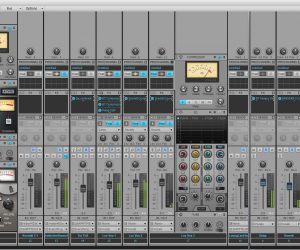
Review: Shure GLX-D Advanced
2.4GHz wireless with a battery of pro features.
Batteries are a big deal in the world of wireless audio. Not so long ago, big events would need an Energizer sponsorship to ensure the battery costs didn’t send them broke. Opening ceremonies would often involve hundreds of FM beltpacks that provide a click and a soundtrack to keep performers in sync. These performers might rehearse half a dozen times. The batteries would be replaced after every rehearsal. You could quickly rack up thousand upon thousands of AAs going into landfill.
Pro wireless systems will give you the option of a recharging cradle, which is a great idea — charge while you stow. Lower cost systems will require you to feed the AA beast.
Shure’s GLX-D, and the new Advanced version I’m reviewing, has done something very different and it’s going to change your life: The receivers have a slot-in recharging bay for the transmitter’s battery. It’s a revelation.
What’s more, Shure’s lithium-ion battery will stay charged for up to 16 hours. Sixteen hours! (That’s after three hours charging.)
When I was sparking up the review rig for the first time, I was a little up against the clock, so I had to pull the batteries out of their charging bays before the accompanying LED had lit green. Glancing at the transmitter display I saw 13:44. Ah crap. Thirteen minutes won’t get me through this rehearsal. Upon closer examination I could hardly believe my eyes: it wasn’t nearly 14 minutes, it was nearly 14 hours of ‘up time’!
Yes, there’s a downside. You can’t pop regular AAs into the GLX-D transmitter if the Shure battery goes bad (it’s not a standard size). But the upsides are so considerable — for your productions, for your planet, for your mental health — that you’d have to say this puts GLX-D in a different league in the low-cost wireless category.
ACCESSORISING
The other big deal for GLX-D Advanced are the accessories. At this end of the market, the manufacturer tends to think you’ll be buying only one or two channels and won’t bother with accessories like antenna combiners or sometimes even rack ears. Just like the standard non-rackmount GLX-D systems. Not so GLX-D Advanced. Shure reckons you can safely use up to nine receivers in the 2.4GHz band (“11 in ideal conditions”). Shure can sell you an antenna combiner/frequency manager and even pro directional antennas to achieve best results when you’re using multiple channels.
Shure doesn’t try to pretend the 2.4GHz ISM band isn’t without its failings. As the manual will attest, this band is likely to be impacted by interference from competing wi-fi transmitters; doesn’t have the same range as UHF; and will normally have a slightly higher latency than a UHF system. In short, the chance of dropouts is higher with a 2.4GHz system.
There’s plenty of salient advice in the GLX-D manual for minimising 2.4GHz snafus. Shure has also employed the latest raft of countermeasures to minimise the chance of dropouts.
ALL I WANT FOR CHRISTMAS…
The review rig comprised six racked up channels and the frequency manager. It was perfect for a Christmas production, where it proved itself to be solid in rehearsals. Frequency-wise it was not only competing with the six GLX-D channels but three other channels of 2.4GHz wireless I had in use. I placed the receiver rack on stage and plumbed the GLX-D channels straight into the stage box, which assisted with stability.
The four SM58 transmitters and two lav mics all performed well. Lots of clarity; good gain.
CHAMPAGNE FEATURES
Demand for wireless is going through the roof. And that demand isn’t necessarily driven by the pro end. It’s the education, church and amateur theatre market that’s hankering for more wireless channels without the huge price tag.
GLX-D Advanced packs some surprising pro features. I can’t tell you how much I love the long-life batteries and charge bays, and I’m a fan of the big-system accessories such as the frequency manager rack. These ‘champagne’-type features on the ‘beer’ budget make GLX-D Advanced a winner.



























RESPONSES